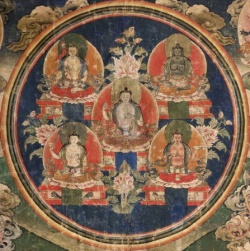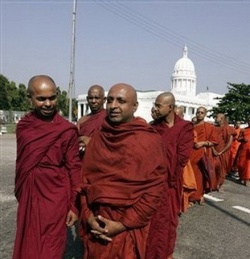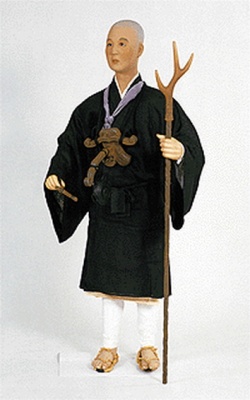Living and Dying with Dignity: A Buddhist View
By Yoichi Kawada
In supporting people as they make difficult ethical decisions, Buddhism does not offer a set of fixed rules. In the case of medical-related decisions, such rules could be rendered outmoded or meaningless by further technological advances. Rather, it seeks to enable people to develop a deeper and clearer understanding of the nature of their own lives and the lives of others as a basis for such decisions. Specifically, it seeks to help people develop the wisdom and compassion that will enable them to experience a lasting sense of satisfaction and happiness. In this sense, Buddhist "precepts" are best understood as an internalized ethic of compassion that guides us toward becoming active, contributing participants in the creative evolution of the universe.
The Buddhist View of Life
As a philosophy, the starting point for Buddhism in ancient India was the effort by Shakyamuni (literally, "the sage of the Shakya clan") to resolve the question of human suffering, the "four sufferings" of birth, aging, sickness and death. (The inclusion of birth may be unexpected, but Buddhist tradition--confirmed by experience--holds that the transition from the warmth and safety of the womb to the cold outer world is an immensely painful one. Birth also symbolizes the suffering inherent in the very process of living.)
In order to resolve the question of human suffering, Shakyamuni engaged in various meditative practices, entering deeply into the inner realms of his own life. There he discovered a consciousness that transcended the purely individual, a layer of consciousness shared by all people. Beyond that, he was able to experience unity with all forms of life. Eventually, the expansion of his inner awareness enabled him to experience oneness with the Earth itself, and with the planets and stars which, like the individual human being, undergo cycles of life and death--forming and coming together, dissolving and ceasing to be. Finally, he was able to experience the dimension of what can be called a universal or cosmic life--the fundamental essence of wisdom and compassion that supports and underlies all existence. All life repeats cycles of birth and death supported by the compassionate functioning of the cosmic life force.
It was his awakening to this that earned Shakyamuni the title of "Buddha" or enlightened one. In the language of philosophy, he discovered an inner, immanent truth that is at the same time transcendent and universal. The inner cosmos he discovered could, in other words, also be observed in the world around him; perceiving a universal life of wisdom and compassion within, Shakyamuni also recognized it in all people. He saw that all people were as capable as he of awakening to the true nature of their lives. From that time, his actions and teachings were dedicated to the work of awakening all people to the eternal, undefiled nature of their lives. These teachings formed the core and basis for the later development of Buddhism into a philosophical system and a movement of popular empowerment.
The goal of Buddhism is happiness. Because Buddhism views all life as interconnected, our efforts to realize happiness for ourselves must include compassionate action for others. Buddhism denies the validity of any form of happiness that is built on the suffering or at the sacrifice of others, including wanton destruction of nature. In the early Buddhist scripture the Dhammapada, we find this passage: "All living beings tremble before violence. All living beings fear death. Placing yourself in the position of these other living beings, you must not kill others, nor must you allow them to kill others." Protecting life from violence and degradation is a core objective of Buddhism.
The Continuum of Life
Human dignity is a key concern in any discussion of bioethics. It must be given full respect in all stages of life. Being able to concretely sense and experience one's own dignity, to have that recognized and respected, are crucial aspects of happiness. In Buddhism, the basis of human dignity is our identity with the universal, cosmic life, and our capacity to awaken to the wisdom and compassion inherent in all life. It is the fundamental nature of life to evolve toward self-realization and self-perfection. This remains true even for people with extremely reduced capacities. In this sense, human dignity is essentially independent of such standards as the ability to make rational decisions or to contribute actively to society.
The unity of the individual self with the cosmos means that the physical and mental, the concrete and spiritual dimensions of experience are also a unity. ("Two but not two" is the term used in Buddhism to describe that which is distinct and separate on the phenomenal level but one on a deeper plane.) In the same way, our lives extend to and embrace our surroundings with which we are also "two but not two." For caregivers, this means that careful and balanced attention must be given to both the physical and spiritual aspects of the human person--one cannot be radically prioritized over the other. It also means that medical practitioners, when treating individuals, are also working with and "treating" the family, friends and community that are an integral part of that individual's life.
Central to Shakyamuni's awakening was his grasp of the eternal nature of life. The insights of Buddhism into the experience of birth and death parallel central concerns of bioethics. In Buddhism, individual lives are seen as emerging from the universal, cosmic life (the process of birth) and returning to it in the process of death. Governed by the law of cause and effect, we repeat endless cycles of life and death, each of which is a unique opportunity to create value (happiness) for ourselves and for others.
In terms of the process of birth, Buddhism views parent and child as manifestations of cosmic life who share a profound connection from the past, as well as a shared purpose or mission to be realized in the present and future. In the simplest terms, a child does not belong to or exist as an extension of the parents. Nor, however, is the child the gift or possession of an external absolute agent. In the Buddhist view, the sperm and ovum of the parents provide the environment or opportunity for a third, autonomous life to become manifest, grow and develop its unique potential within the context of the profound bonds of interconnection they share. These bonds are not a cold, biological fact that conflates genetic identity with ownership. They are developed and deepened through the process of care and parenting, and it is against this backdrop that specific reproductive therapies can be considered and often difficult personal choices made.
Dignity in Dying
At the other end of the life continuum, Buddhism views the process of dying as an invaluable opportunity to manifest one's human dignity fully. Because Buddhism does not view death as an intrinsically negative experience, it does not generally support the use of "heroic" interventions that only prolong the physical existence of a patient. Nor, on the other hand, does it support any intervention that deliberately shortens a person's life.
As Shakyamuni's experience in meditation would suggest, Buddhism views consciousness as something not limited to such superficial aspects as sensation, perception and rational thought. Rather, it assumes the existence of deep layers of consciousness that are shared by and connect individuals (that are "transpersonal," to borrow a contemporary expression) and which are ultimately unified with all being.
Just as the process of conception, gestation, birth and subsequent growth can be understood as a continuum of emergence and development from the common sources of universal life, the process of dying can be viewed as the process by which individual consciousness recedes into deeper levels until it fully merges with the cosmic life. This is not marked by abruptly delineated stages, but is a continuum on which "death" can best be understood as the point at which the dying process has become irreversible. Current medical technology is incapable of reviving people who have reached the stage of "brain death," and my understanding of Buddhism can accept this as the present-day meaning of death.
This view of death requires that people in the process of dying be treated at all times with respect. Long after they have lost the ability to express themselves, it appears that people continue to hear and otherwise sense their surroundings. And even after the capacity to organize sensations into rational thoughts or impressions has been lost, the deepest levels of consciousness continue to function, directly sensing the love and concern of family members and friends. Some Buddhist texts offer quite specific guidelines for behavior around the dying--to avoid speaking loudly or about subjects that the dying person would find disturbing, for example. Because dying is seen as a process, these texts hold that these guidelines should be observed for some time after the time of "death."
In this sense, the inner state of the individual is the key to the Buddhist idea of death with dignity. As physical function declines and consciousness recedes toward the point of irreversibility, what kind of resolve and drama are enacted within the inner realm of the individual? How does that person deal with the regrets and satisfactions, a final settlement with all that has been painful and bitter, good and rewarding, in this life? In the ideal Buddhism offers for the final stage of life, wisdom and compassion figure centrally. An ideal death is one in which, supported by others and compassionately engaged with them to the last moments, we are able to sense the bedrock reality of our dignity, and can respond to this life's gifts with a profound sense of appreciation and gratitude. In this way, we can mark a new and hopeful departure toward the future.
Dr. Yoichi Kawada has a Ph.D. in immunology and is author of several books on Buddhism and medicine. Since 1988 he has been director of the Tokyo-centered Institute of Oriental Philosophy, established by Daisaku Ikeda in 1962 to make Asia's philosophical heritage accessible to the world.



